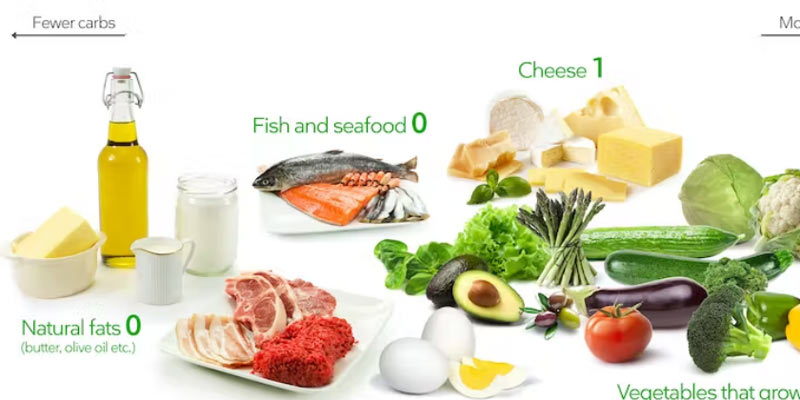Are you looking for a diet to help you lose weight, increase energy levels and improve overall health? If so, the zero-carb diet may be the perfect choice. Lately, this way of eating has become increasingly popular among people striving to reach their health goals and better manage their weight. But what exactly is a zero-carb diet, and how does it work? In this blog post, we'll discuss all the key details about this dietary pattern so that you can determine whether or not it's right for your individual needs.
We’ll explain what foods must be avoided when following this diet, and some delicious recipes that make low-carb living easy and enjoyable. So get ready to learn why a zero-carb lifestyle might just be your ticket to success!
What is a zero-carb diet, and why should you consider it?
A zero-carb diet is a very restrictive way of eating that eliminates all sources of carbohydrates, including sugars and starches, from your daily meals. By eliminating these types of food, you can better manage hunger levels and maintain a healthy weight. This type of diet is beneficial in helping to reduce overall body fat, improve metabolic health and energy levels.
In addition to its benefits for weight management, this diet can also help reduce the risk of developing certain diseases. Studies have shown that following a zero-carb diet may reduce the risk of type 2 diabetes, heart disease, and some types of cancer. This is partly due to the fact that when you eliminate carbs from your diet, you're also reducing your intake of processed foods and unhealthy fats.
For those looking to lose weight, reduce their risk of disease, or improve overall health, a zero-carb diet is worth considering. It's important to note though, that this type of eating plan should be done in moderation and is unsuitable for everyone. It is important to speak with your doctor before beginning a zero-carb diet, as some individuals may need to adjust their medication or supplement intake depending on their health needs.
Benefits of a zero-carb diet for weight loss and overall health
A zero-carb diet is known for its weight loss and health benefits. Studies have found that following this type of eating plan can be highly effective in reducing body fat and increasing metabolic health. Additionally, a zero-carb diet has been associated with improved energy levels, which can help you better manage your cravings for unhealthy foods.
In addition to promoting weight loss, a zero-carb diet can help reduce the risk of developing certain diseases. Studies have found that this type of eating plan may benefit those with diabetes, heart disease, and some types of cancer by reducing their blood sugar levels and improving their cholesterol markers.
Foods to eat/avoid on a zero-carb diet
When following a zero-carb diet, it is important to know what foods must be avoided and which can still be consumed. Generally, all sources of carbohydrates should be eliminated from the diet, including sugars and starches. This means avoiding grains, potatoes, sweets, bread, dairy products, fruits, and vegetables. Processed foods, including those high in sugar and unhealthy fats, should also be avoided.
Foods that can still be consumed on a zero-carb diet include meats such as beef, poultry, pork, and fish; eggs; nuts and seeds; some dairy products such as cheese and cream; and certain oils like olive oil. Unsweetened beverages such as water, tea, and coffee can also be enjoyed.
It is important to note that while a zero-carb diet may help you reach your weight loss or health goals, it is not suitable for everyone. Before beginning this type of eating plan, you should speak with your doctor about any potential risks or concerns.
Tips for transitioning to a zero-carb diet
Transitioning to a zero-carb diet can be challenging. However it is possible with the right approach. Here are some tips for making the transition more successful:
• Start small and make gradual changes to your eating habits.
• Focus on eliminating refined carbohydrates such as white bread, sweets, and processed foods.
• Incorporate more sources of healthy proteins such as lean meats and eggs, as well as nuts and seeds.
• Drink plenty of water to help you stay hydrated throughout the day.
• Read food labels carefully to ensure your meals are low in carbs.
• Prepare meals ahead of time to make it easier to stick to your new eating plan.
• Increase fiber intake to help keep you feeling full for longer.
• Set realistic goals and focus on the positive changes from following a zero-carb diet.
Common mistakes when starting a zero-carb diet
When beginning a zero-carb diet, it is important to be aware of the common mistakes that some people make. These can include:
• Not drinking enough water throughout the day.
• Eating too much protein and not enough healthy fats.
• Consuming processed foods with low nutritional value.
• Not getting enough fiber and vitamins from food sources.
• Failing to read labels carefully when grocery shopping.
• Expecting to see results too quickly and giving up if they don’t come fast enough.
Getting started with your zero-carb diet plan
If you’re ready to begin your zero-carb diet, it is important to remember that each person has their own needs and goals. Therefore, creating a plan that works for you is best. Start by learning more about the diet and understanding what foods must be avoided. Next, incorporate healthy sources of protein, fats, and fiber into your meals.
Additionally, stay hydrated throughout the day and avoid processed foods as much as possible. Lastly, consider consulting with a nutrition professional to ensure that you meet all your nutrient needs while on a diet.
FAQs
Q: What Are the Benefits of Following a Zero-Carb Diet?
A: Followers of a zero-carb diet typically experience improved digestion, increased energy levels, weight loss, and better overall health. This is because these diets generally consist of nutrient-dense whole foods that are low in sugars and processed carbohydrates. Additionally, studies have shown that low-carb diets can be beneficial for reducing inflammation and improving blood sugar control, which is important for overall health.
Q: What Foods Should I Avoid When Following a Zero-Carb Diet?
A: Foods to avoid when following a zero-carb diet include grains, legumes, starches, potatoes, sweets, and most fruits and vegetables. This also includes processed foods such as chips, crackers, cookies, and candy. It is important to read labels carefully when shopping for food, as some packaged items can contain hidden sources of carbohydrates.
Q: Is It Safe to Follow a Zero-Carb Diet?
A: While some studies have shown that following a low-carb diet can be beneficial, it is important to note that this type of eating pattern should only be followed under the guidance of a healthcare professional. Additionally, it is necessary to ensure you are getting all the essential macronutrients and vitamins your body needs. A zero-carb diet can be safe and beneficial for overall health if done correctly.
Conclusion
The zero-carb diet is an eating pattern gaining popularity in recent years. It involves avoiding all grains, starches, sugars, and most fruits and vegetables while focusing on nutrient-dense animal products. Following this diet can provide many benefits, such as improved digestion and increased energy levels. However, it is important to remember that it should only be followed under the guidance of a healthcare professional. With this information in mind, you can determine if a zero-carb diet is right for your needs.

Low-Glycemic Fruits for Diabetes
Apr 24, 2023

Benefits of Gooseberries
Apr 25, 2023

What is Neuralgia
Apr 20, 2023

Ways to Get Rid of Bloating
Apr 30, 2023

Lean Protein Foods
Apr 25, 2023

Winning the Battle Against Laryngitis: Natural Remedies that Work
Aug 03, 2023

Common Causes of Inner Knee Pain
Apr 24, 2023

Remedies To Get Rid of Headaches
Apr 18, 2023





